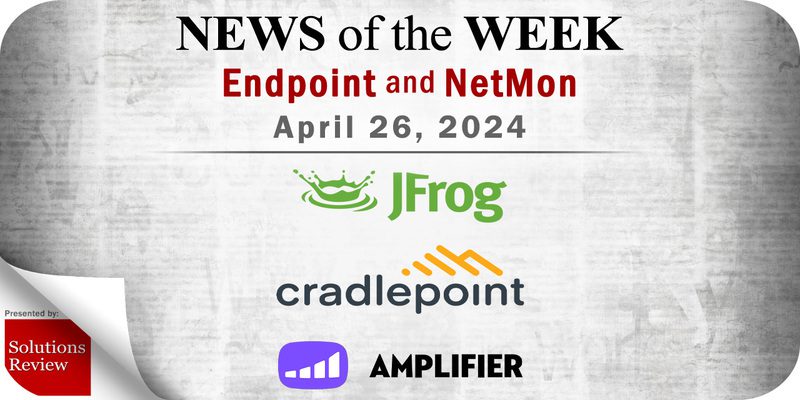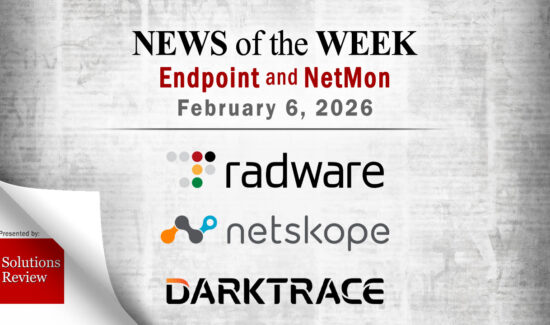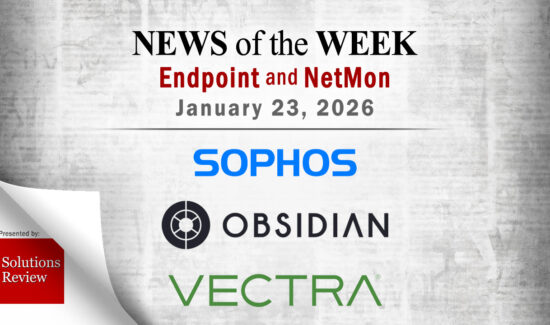Endpoint Security and Network Monitoring News for the Week of April 26; JFrog, Cradlepoint, Amplifier Security, and More


The editors at Solutions Review have curated this list of the most noteworthy endpoint security and network monitoring news for the week of April 26. This curated list features endpoint security and network monitoring vendors such as JFrog, Cradlepoint, Amplifier Security, and more.
Keeping tabs on all the most relevant endpoint security and network monitoring news can be a time-consuming task. As a result, our editorial team aims to provide a summary of the top headlines from the last month in this space. Solutions Review editors will curate vendor product news, mergers and acquisitions, venture capital funding, talent acquisition, and other noteworthy endpoint security and network monitoring news items.
Endpoint Security and Network Monitoring News for the Week of April 26
JFrog Announces Integration with MLflow
Software supply chain company JFrog Ltd. this week announced a new machine learning lifecycle integration between JFrog Artifactory and MLflow, an open-source software platform originally developed by Databricks Inc. The new integration is designed to give JFrog users a way to build, manage and deliver machine learning models and generative artificial intelligence-powered apps along with other software development components in a streamlined, end-to-end DevSecOps workflow. Through the integration, companies can validate the security and provenance of machine learning models to ensure responsible AI practices.
Backslash Security Research Identifies Security Blind Spots in LLM-Generated Code
Backslash Security, an appsec solutions provider, announced this week the findings of its GPT-4 developer simulation exercise, designed and conducted by the Backslash Research Team, to identify security issues associated with LLM-generated code. “The way we create code is rapidly changing, and that means the way that we secure code must also change. AI-generated code offers immense possibility, but also introduces an entirely new scale of security challenges – and application security teams now bear the burden of securing an unprecedented volume of potentially vulnerable code due to the sheer speed of AI-enabled software development,” said Shahar Man, co-founder and CEO of Backslash Security. “Our research shows that securing open source code is more critical than ever before due to product security issues being introduced by AI-generated code that is associated with OSS.”
Cradlepoint Launches “5G-Optimized” NetCloud SASE Platform
Cradlepoint, part of Ericsson, a global leader in cloud-delivered LTE and 5G wireless network and security solutions, this week launched its single vendor Secure Access Service Edge (SASE) solution, NetCloud SASE. Designed to serve agile enterprises, NetCloud SASE integrates cellular-centric SD-WAN and security into a fully unified solution. The cloud-delivered platform enables lean IT teams to provision true zero-trust networks potentially in as little as six minutes. “Cradlepoint has more than a decade of experience simplifying cellular networking for enterprises operating in the most challenging environments on the planet,” said Pankaj Malhotra, Head of Enterprise Networking and Cybersecurity Products, Cradlepoint, part of Ericsson. “We are now enhancing the simplicity of enterprise-class network security for even the leanest IT organizations by introducing a SASE solution that integrates cellular, SD-WAN, and security in a unified platform.”
Critical Start Announces Upcoming MDR for OT Security Platform
Critical Start, an MDR solutions provider, announced the upcoming availability of Critical Start Managed Detection and Response (MDR) services for Operational Technology (OT). A critical area of risk for industrial organizations, OT is another component of Critical Start’s Managed Cyber Risk Reduction strategy. MCRR combines threat, vulnerability, and risk monitoring and management so organizations can have a strategic, data-driven, risk-based approach to their security program.
Hexnode Survey Reveals Cybersecurity Imbalance in Supply Chain
Based on responses from over 1000 IT professionals, a survey conducted by UEM solutions provider Hexnode, reveals a concerning trend: 77 percent of employees express doubts about the effectiveness of current security measures, particularly regarding cybersecurity threats within supply chains. “The supply chain sector demands equilibrium among its constituent elements: technology, employees, and third-party vendors. It’s akin to a domino effect; a vulnerability in one aspect can precipitate the collapse of the entire structure,” remarked Apu Pavithran, CEO and Founder of Hexnode. “By embracing a blend of technological innovation, strategic investments, and unwavering adherence to cybersecurity best practices, companies can navigate a trajectory towards a future where digitalization not only optimizes efficiency and flexibility but also safeguards the integrity and security of the entire supply chain ecosystem.”
Portnox and Bugcrowd to Launch Private Bug Bounty Program
Portnox, a provider of cloud-native, zero trust access control solutions, this week announced it will soon launch a private bug bounty program with Bugcrowd, the leader in crowdsourced security. The Portnox bug bounty program will offer a bounty for ethical hackers, also known as “white hat hackers,” to uncover and report software security vulnerabilities within Portnox’s production services. Bugcrowd will manage the submission and reward process, which is designed to ensure a streamlined experience for all participants. Participants can earn a range of payments, depending on the criticality of the submitted vulnerability. Ethical hackers that are already active on Bugcrowd are invited to participate in private bug bounty programs once they become active on the platform through hacking public bug bounties. Companies that currently participate in public bug bounty programs with Bugcrowd include Atlassian, ExpressVPN, Rapyd, T-Mobile, USAA, Viator, and more.
Amplifier Security Emerges From Stealth with $3.3M in Pre-Seed Funding
This week, Atlanta-based Amplifier Security emerged from stealth with $3.3 million in pre-seed funding, led by Cota Capital with participation from multiple other VCs and tech industry luminaries, including the founders of Slack, Skyflow and Mercury. “Security tools & teams mostly operate in the background, and engaging the workforce on security issues always feels like an interruption – for both parties. The lack of such real-time human engagement is also a missed opportunity to educate people on “the why” behind the risk of each such security finding and gap. Because of today’s hybrid and dynamic workplaces where everyone is moving fast in the spirit of hyper-productivity, this problem has become harder to solve at scale,” explained Shreyas Sadalgi, Co-Founder of Amplifier Security.
Expert Insights Section
 Watch this space each week as our editors will share upcoming events, new thought leadership, and the best resources from Insight Jam, Solutions Review’s enterprise tech community for business software pros. The goal? To help you gain a forward-thinking analysis and remain on-trend through expert advice, best practices, trends and predictions, and vendor-neutral software evaluation tools.
Watch this space each week as our editors will share upcoming events, new thought leadership, and the best resources from Insight Jam, Solutions Review’s enterprise tech community for business software pros. The goal? To help you gain a forward-thinking analysis and remain on-trend through expert advice, best practices, trends and predictions, and vendor-neutral software evaluation tools.
Phishing Campaigns and Why The Lincoln Project Was Lucky
“If the Lincoln Project only got scammed out of $35,000 they are relatively lucky because BEC amounts in the hundreds of thousands are common. Having someone pose as a vendor in order to entice victims into paying invoices is a relatively common BEC tactic, but going out of their way to compromise a vendor to perform BEC is less common. Given that the Lincoln Project was not the only victim and the engagement was BEC rather than a phishing campaign, it is unlikely that this was a targeted attack but rather that the threat actor compromised a vendor and simply billed everyone on their customer list.”
-Max Gannon, Cyber Intelligence Team Manager at Cofense
















